第11章 动词时态及语态
动词的时态和语态
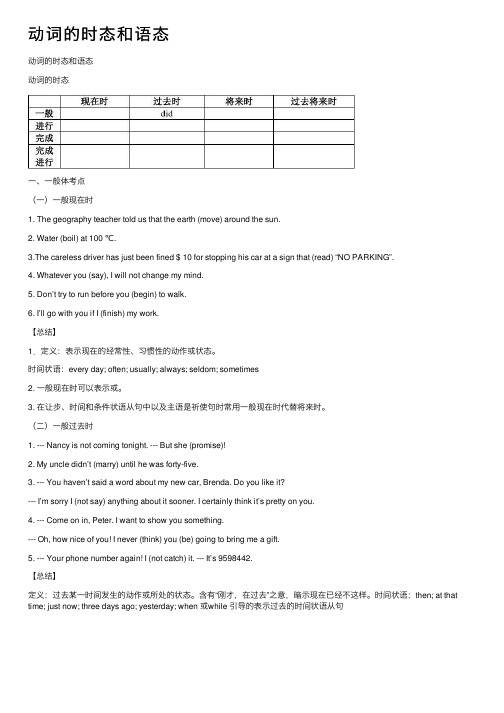
动词的时态和语态动词的时态和语态动词的时态⼀、⼀般体考点(⼀)⼀般现在时1. The geography teacher told us that the earth (move) around the sun.2. Water (boil) at 100 ℃.3.The careless driver has just been fined $ 10 for stopping his car at a sign that (read) “NO PARKING”.4. Whatever you (say), I will not change my mind.5. Don’t try to run before you (begin) to walk.6. I’ll go with you if I (finish) my work.【总结】1.定义:表⽰现在的经常性、习惯性的动作或状态。
时间状语:every day; often; usually; always; seldom; sometimes2. ⼀般现在时可以表⽰或。
3. 在让步、时间和条件状语从句中以及主语是祈使句时常⽤⼀般现在时代替将来时。
(⼆)⼀般过去时1. --- Nancy is not coming tonight. --- But she (promise)!2. My uncle didn’t (marry) until he was forty-five.3. --- You haven’t said a word about my new car, Brenda. Do you like it?--- I’m sorry I (not say) anything about it sooner. I certainly think it’s pretty on you.4. --- Come on in, Peter. I want to show you something.--- Oh, how nice of you! I never (think) you (be) going to bring me a gift.5. --- Your phone number again! I (not catch) it. --- It’s 9598442.【总结】定义:过去某⼀时间发⽣的动作或所处的状态。
高中语法动词的时态和语态

一、一般现在时1、表示经常发生的习惯性的、现在反复出现的动作或状态,常用的时间状语有:always,usually,seldom, sometimes, every day, now and then, once a week等。
2、表示眼下或目前等现在时间所发生的动作或存在的状态,这种状态带有一定的持续性。
3、表示客观事实或普遍真理。
4、书报的标题,故事的叙述,小说、戏剧、电影等情节介绍,图片的说明等。
5、时间表、时刻表、日程表、节目单、课程表等按规定将要发生的动作,只限于go, arrive, leave, start, stay, return, begin, come等动词。
6、在时间、条件、方式、让步状语从句中,表示将来的动作。
注意:一般现在时可以用于定语从句或宾语从句中表示将来。
7、用在某些表达中,表示现在正在发生的动作或存在的状态。
Here comes the bus!How it rains!二、一般过去时1、表示在过去某一时间点发生的动作或所处的状态,与现在没有关系。
常用的时间状语有:yesterday, last night, at that time等。
2、表示在过去某一段时间里反复出现的动作或状态,与现在没有关系。
3、用used to do或would do表示过去经常或反复发生的动作。
4、有些情况发生的时间没清楚表明,但实际上是“刚才,刚刚”发生的,属于过去时间,应使用过去时态。
常见的有I didn’t know…或I forgot…等。
5、一般过去时可与today, this week, this month等时间状语连用。
三、一般将来时1、will/shall do(1)表示将来会出现的动作或状态。
常用的时间状语:this evening, tomorrow, next week/month…,at the end of this term, in a few minutes等。
动词时态与语态在时间状语从句中的特殊用法和语气表达方式及其使用技巧

动词时态与语态在时间状语从句中的特殊用法和语气表达方式及其使用技巧动词时态和语态在语言表达中起着至关重要的作用。
在时间状语从句中,时态和语态的使用不仅影响到语句的意思和语气,还可以表达出不同的情感和态度。
本文将介绍动词时态和语态在时间状语从句中的特殊用法和语气表达方式,以及一些使用技巧。
一、动词时态在时间状语从句中的特殊用法和语气表达方式1. 一般现在时一般现在时常用于表示客观事实或普遍真理。
在时间状语从句中,一般现在时可以用来表示将来的时间点或某个事件的发生时间。
例如:- When he comes back, we will have a party.- I will visit my grandparents when I finish my homework.2. 一般过去时一般过去时常用于表示过去发生的事情。
在时间状语从句中,一般过去时可以用来表示过去某个时间点发生的事件或者已经完成的动作。
例如:- She told me that she had already seen the movie.- I felt tired after I finished the race.3. 一般将来时一般将来时常用于表示将来发生的动作或者存在的状态。
在时间状语从句中,一般将来时可以用来表示主句之后发生的动作。
例如:- I will call you when I arrive at the airport.- Don't forget to bring an umbrella if it rains tomorrow.4. 现在进行时现在进行时常用于表示现阶段正在进行的动作。
在时间状语从句中,现在进行时可以用来表示将来某个时间点正在进行的动作。
例如:- He will be sleeping when you get home.- They will be waiting for the bus when it arrives.5. 过去进行时过去进行时常用于表示过去某个时间点正在进行的动作。
动词时态和语态总结
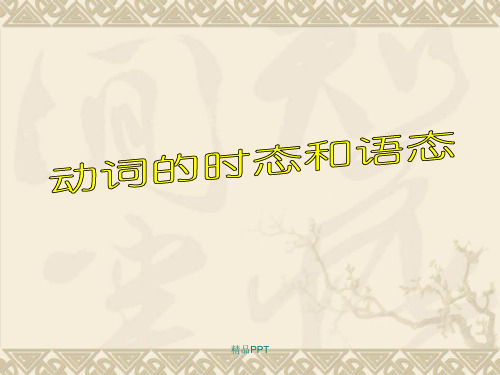
四、现在进行时 1.表示说话时正在进行而尚未完成的动作或状态。
We are having an English lesson. 2.表示现阶段一直在进行的动作,但说话时不一定正在进行。
The workers are building a new factory.
3.有时可表示即将发生的动作〔只限于go, come, stay, leave, start, begin, arrive, return, fly, drive等动词〕这时常有一个
played table tennis almost everyday. 4〕在条件、时间状语从句中表示过去将来的动作。
They said they wo精u品lPdPTlet us know if they heard any news about him.
三. 一般将来时 一般将来时表示将来要发生的动作和存
精品PPT
二、一般过去时 1〕表达特定的过去时间内发生的动作或存在的状况,
常与last week/year/ month/ spring, a few days ago, in 1998等时间状语以及when等连词引
导的时间状语从句连用。
We had a good swim last Sunday.
3〕用在问句中,表示委婉礼貌; Will you be reading anything else? When shall we be meeting again?
When I was young, I took cold baths regularly. 2〕表达过去连续发生的一件件事。
He got up early in the morning, fetched water,
动词的语态和时态的区别与用法
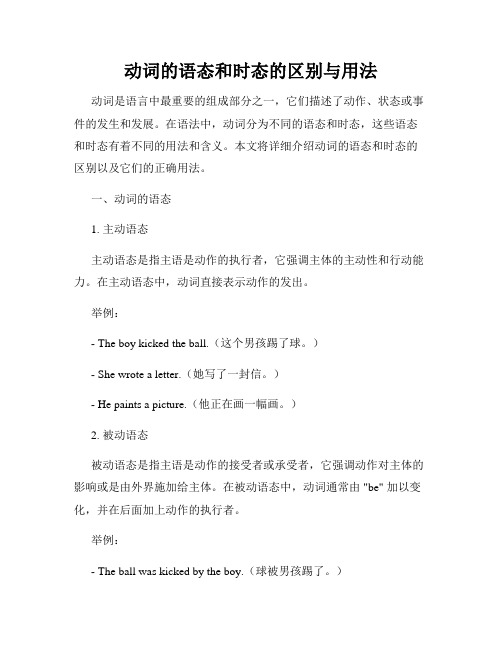
动词的语态和时态的区别与用法动词是语言中最重要的组成部分之一,它们描述了动作、状态或事件的发生和发展。
在语法中,动词分为不同的语态和时态,这些语态和时态有着不同的用法和含义。
本文将详细介绍动词的语态和时态的区别以及它们的正确用法。
一、动词的语态1. 主动语态主动语态是指主语是动作的执行者,它强调主体的主动性和行动能力。
在主动语态中,动词直接表示动作的发出。
举例:- The boy kicked the ball.(这个男孩踢了球。
)- She wrote a letter.(她写了一封信。
)- He paints a picture.(他正在画一幅画。
)2. 被动语态被动语态是指主语是动作的接受者或承受者,它强调动作对主体的影响或是由外界施加给主体。
在被动语态中,动词通常由 "be" 加以变化,并在后面加上动作的执行者。
举例:- The ball was kicked by the boy.(球被男孩踢了。
)- A letter was written by her.(一封信被她写了。
)- The picture is being painted by him.(这幅画正在被他画。
)被动语态多用于强调动作的接受者或者主体的无法执行动作的情况。
二、动词的时态1. 现在时现在时态用于表示目前正在进行或经常发生的动作、状态或事件。
举例:- I go to school every day.(我每天去学校。
)- She is reading a book now.(她现在在读一本书。
)- They often play football on weekends.(他们经常在周末踢足球。
)2. 过去时过去时态用于表示已经发生或已经结束的动作、状态或事件。
举例:- I went to the park yesterday.(我昨天去了公园。
)- He studied in the library for three hours.(他在图书馆学习了三个小时。
动词的基本时态、语态的构成及其用法

第一人称: 陈述句: I will call you.
I am going to call you.
否定句: We will not call you. I am not going to call you.
一般疑问句: Will we eat lunch ? Are we going to eat lunch?
stop—stopped; plan—planned; prefer— preferred。 (5)不规则动词的过去式需特殊记忆。
第一人称: 陈述句: I liked you.
I was a student.
否定句: We didn't like you. I was not a teacher.
一般疑问句:Will she play basketball at four?
Is she going to play outside?
Don't worry. You won't be late. 不用担心,你不会迟到的。
Will you leave for Beijing next week?
Did you have any problems on your journey? 你在旅途中有一些困难吗?
Were most people too busy making a living in early times?在早期,大部分人忙着谋生吗?
Modern soccer didn't become off方运动。
第三人称: 陈述句:She will play basketball at four.
She is going to play basketball at four.
专题11 动词的时态和语态-2021高一英语期末备考语法专练(解析版)
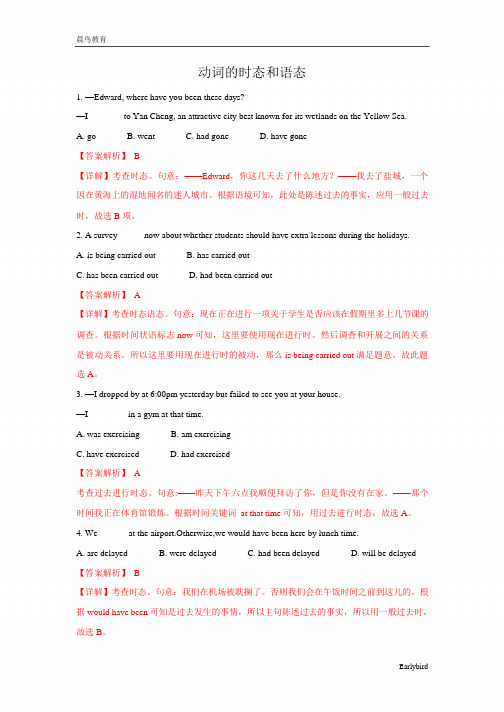
动词的时态和语态1. —Edward, where have you been these days?—I________to Yan Cheng, an attractive city best known for its wetlands on the Yellow Sea.A. goB. wentC. had goneD. have gone【答案解析】B【详解】考查时态。
句意:——Edward,你这几天去了什么地方?——我去了盐城,一个因在黄海上的湿地闻名的迷人城市。
根据语境可知,此处是陈述过去的事实,应用一般过去时,故选 B 项。
2. A survey _____ now about whether students should have extra lessons during the holidays.A. is being carried outB. has carried outC. has been carried outD. had been carried out【答案解析】A【详解】考查时态语态。
句意:现在正在进行一项关于学生是否应该在假期里多上几节课的调查。
根据时间状语标志 now 可知,这里要使用现在进行时。
然后调查和开展之间的关系是被动关系,所以这里要用现在进行时的被动,那么 is being carried out 满足题意。
故此题选 A。
3. —I dropped by at 6:00pm yesterday but failed to see you at your house.—I ________ in a gym at that time.A. was exercisingB. am exercisingC. have exercisedD. had exercised【答案解析】A考查过去进行时态。
句意:——昨天下午六点我顺便拜访了你,但是你没有在家。
英语《动词的时态和语态》语法知识及英语学习方法

英语《动词的时态和语态》语法知识及英语学习方法动词的时态和语态一、一般现在时1、表示经常发生的习惯性的、现在反复出现的动作或状态,常用的时间状语有:always,usually,seldom, sometimes, every day, now and then, once a week等。
2、表示眼下或目前等现在时间所发生的动作或存在的状态,这种状态带有一定的持续性。
3、表示客观事实或普遍真理。
4、书报的标题,故事的叙述,小说、戏剧、电影等情节介绍,图片的说明等。
5、时间表、时刻表、日程表、节目单、课程表等按规定将要发生的动作,只限于go, arrive, leave, start, stay, return, begin, come等动词。
6、在时间、条件、方式、让步状语从句中,表示将来的动作。
注意:一般现在时可以用于定语从句或宾语从句中表示将来。
7、用在某些表达中,表示现在正在发生的动作或存在的状态。
Here comes the bus!How it rains!二、一般过去时1、表示在过去某一时间点发生的动作或所处的状态,与现在没有关系。
常用的时间状语有:yesterday, last night, at that time等。
2、表示在过去某一段时间里反复出现的动作或状态,与现在没有关系。
3、用used to do或would do表示过去经常或反复发生的动作。
4、有些情况发生的时间没清楚表明,但实际上是“刚才,刚刚”发生的,属于过去时间,应使用过去时态。
常见的有I didn’t know…或I forgot…等。
5、一般过去时可与today, this week, this month等时间状语连用。
三、一般将来时1、will/shall do(1)表示将来会出现的动作或状态。
常用的时间状语:this evening, tomorrow, next week/month…,at the end of this term, in a few minutes等。
动词时态与语态
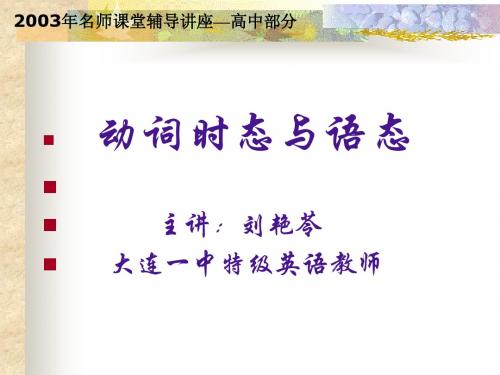
动词的时态和语态
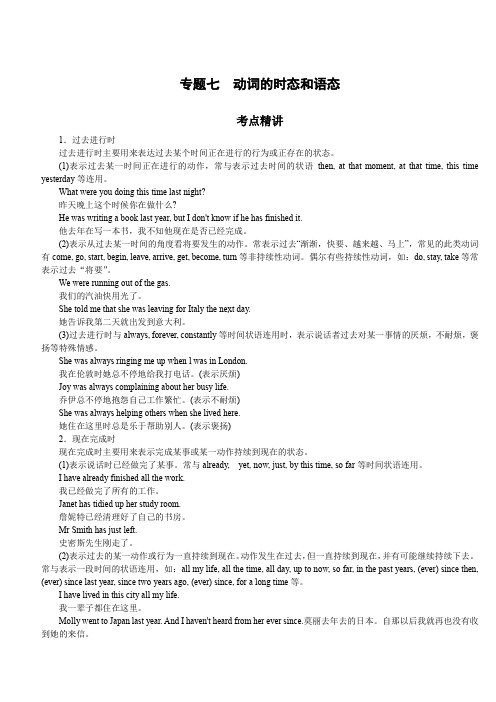
专题七动词的时态和语态考点精讲1.过去进行时过去进行时主要用来表达过去某个时间正在进行的行为或正存在的状态。
(1)表示过去某一时间正在进行的动作,常与表示过去时间的状语then, at that moment, at that time, this time yesterday等连用。
What were you doing this time last night?昨天晚上这个时候你在做什么?He was writing a book last year, but I don't know if he has finished it.他去年在写一本书,我不知他现在是否已经完成。
(2)表示从过去某一时间的角度看将要发生的动作。
常表示过去“渐渐,快要、越来越、马上”,常见的此类动词有come, go, start, begin, leave, arrive, get, become, turn等非持续性动词。
偶尔有些持续性动词,如:do, stay, take等常表示过去“将要”。
We were running out of the gas.我们的汽油快用光了。
She told me that she was leaving for Italy the next day.她告诉我第二天就出发到意大利。
(3)过去进行时与always, forever, constantly等时间状语连用时,表示说话者过去对某一事情的厌烦,不耐烦,褒扬等特殊情感。
She was always ringing me up when l was in London.我在伦敦时她总不停地给我打电话。
(表示厌烦)Joy was always complaining about her busy life.乔伊总不停地抱怨自己工作繁忙。
(表示不耐烦)She was always helping others when she lived here.她住在这里时总是乐于帮助别人。
动词的时态和语态

动词的时态和语态一、一般现在时1、表示经常发生的习惯性的、现在反复出现的动作或状态,常用的时间状语有:always,usually,seldom, sometimes, eve ry day, now and then, once a week等。
2、表示眼下或目前等现在时间所发生的动作或存在的状态,这种状态带有一定的持续性。
3、表示客观事实或普遍真理。
4、书报的标题,故事的叙述,小说、戏剧、电影等情节介绍,图片的说明等。
5、时间表、时刻表、日程表、节目单、课程表等按规定将要发生的动作,只限于go, arrive, leave, start, stay, return, begin, come等动词。
6、在时间、条件、方式、让步状语从句中,表示将来的动作。
注意:一般现在时可以用于定语从句或宾语从句中表示将来。
7、用在某些表达中,表示现在正在发生的动作或存在的状态。
Here comes the bus!How it rains!二、一般过去时1、表示在过去某一时间点发生的动作或所处的状态,与现在没有关系。
常用的时间状语有:yesterday, last night, at that time等。
2、表示在过去某一段时间里反复出现的动作或状态,与现在没有关系。
3、用used to do或would do表示过去经常或反复发生的动作。
4、有些情况发生的时间没清楚表明,但实际上是“刚才,刚刚”发生的,属于过去时间,应使用过去时态。
常见的有I didn’t know…或I forgot…等。
5、一般过去时可与today, this week, this month等时间状语连用。
三、一般将来时1、will/shall do(1)表示将来会出现的动作或状态。
常用的时间状语:this evening, tomorrow, next week/month…,at the end of this term, in a few minute s等。
【直击中考】山西省2014中考英语总复习 第二部分 语法专题突破 专题十一 动词时态和语态(含历年中考真题)

专题十一动词时态和语态重难点精讲考点精讲考点一动词时态的判定及用法初中阶段学习了8种常见时态,而学生需要重点掌握的为以下6种时态,现对其一一进行讲解。
一般现在时(2011年26题考查)构成:make/ makes(以make为例)often, sometimes, usually, always, twice a month, on Sundays, every week等连用)。
如:He usually leaves for school at 7 in the morning. 他经常早上7点去学校。
She is always ready to help others.她总是乐于助人。
The moon moves around the earth.月亮绕着地球转。
when, if, after, before, as soon as等引导的时间、条件状语从句中,用一般现在时表将来。
如:I will call you as soon as I get the news.我一得到消息就给你打电话。
一般过去时(2013年25题考查)暗示词:just now,... ago, in 1980, last month, this morning, yesterday, the other day, last night, used to, at ten o’clock, last year, at the end of last term 构成:made(以make为例)We went to the History Museum last Monday.上周一我们去了历史博物馆。
since引导的从句须用一般过去时。
如:It is been a long time since we lived here.我们住在这儿已经很长时间了。
一般将来时暗示词:tomorrow, tomorrow morning, next year, next Sunday morning, from now on, soon, in a few years, in the future构成:will make/ is going to make (以make为例)It is going to be a fine day tomorrow.明天将天气晴朗。
动词时态与语态及时态一致
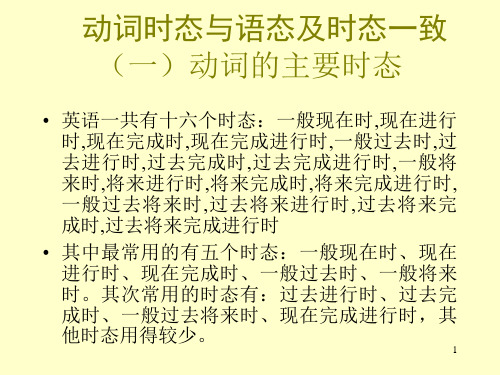
• 3 、在主动句中接不定式时不用,但在被动句 中须用。 • Eg: He has been made to come to terms with unfair conditions. • • 4、被动语态的时态、数、性的一致。 • Eg: Most environmental problems exist because adequate measures for preventing them were not taken in the past. (not “were not taken”)
3、复合句中的时态要一致
• 1 )名词性从句和主句的时态一致:主句若用 过去时,从句必须使用相应的过去时。 • Eg: US forecasting firms predicted just a few months ago that inflation would be back down into single digits in 1980. • 2)定语从句中的时态呼应 • A .定语从句的谓语表示的动作若与主句谓语 表示的动作同时发生,则要求使用相同的时态。 • Eg: Before he died the old man who lived next door to the drugstore used to feed the pigeons 8 three times a day. (not “who lives”)
1
一般时态/进行时/完成时态/ 完成进行时态
• 现 在 write/writes--am/are/is writing--has/have written--has /have been writing • 过 去 wrote--was/were writing--had written--had been writing • 将 来 shall/will write--shall/will be writingshall/will have written--shall/will have been writing • 过 去 将 来 should/would write--should/would be writing--should/would have written--should/would have been writing 2 •
动词的时态和语态及其用法
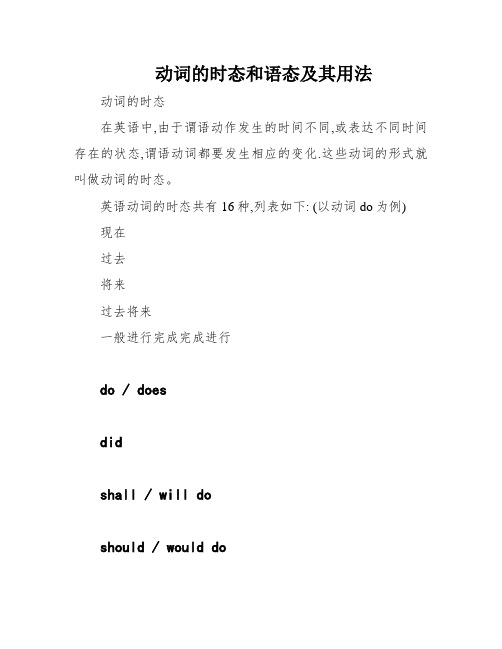
动词的时态和语态及其用法动词的时态在英语中,由于谓语动作发生的时间不同,或表达不同时间存在的状态,谓语动词都要发生相应的变化.这些动词的形式就叫做动词的时态。
英语动词的时态共有16种,列表如下: (以动词do为例)现在过去将来过去将来一般进行完成完成进行do / doesdidshall / will doshould / would doam / is /aredoingwas / were doingshall / will be doingshould / would be doinghave / has donehad doneshall / will have doneshould / would have donehave /has / been XXX / will have been doingshould / would have been doing时态的用法:一般现在时:1)现在惯性的举措或存在的状态。
2)客观事实,真理或格言。
3)表示现在将来时。
(只用于时状或条状从句中)一般曩昔时:1)曩昔惯性的的举措或存在的状态。
2)用于“were-型”和“if-型”假造语气中。
3)表示过去将来时。
(只用于时状或条状从句中)现在进行时:1)在现在某一时刻或某段时间里正在进行的举措。
2)按计划安排在现在的将来发生的举措。
曩昔进行时:1)在曩昔的某一时刻或某段时间里正在进行的举措。
2)按计划安排在曩昔的将来发生的举措。
现在完成时:1)举措发生在曩昔,对现在有影响(注:瞬间性动词的已完成用法)2)动作发生在过去,一直延续到现在,对目前有影响。
(注:延续性动词的已完成或未完成用法)过去完成时:过去有两个动作,其中,一个动作发生时,另一个动作已经完成。
(注:过去的过去,用过去完成时)现在完成进行时:动作发生在过去,一直延续到现在,并很可能继续延续下去。
曩昔完成进行时:曩昔有两个举措。
其中,一个举措发生时,另外一个举措已经完成,但该举措很可能继续延续下去。
英语语法:初中英语动词时态和语态讲解
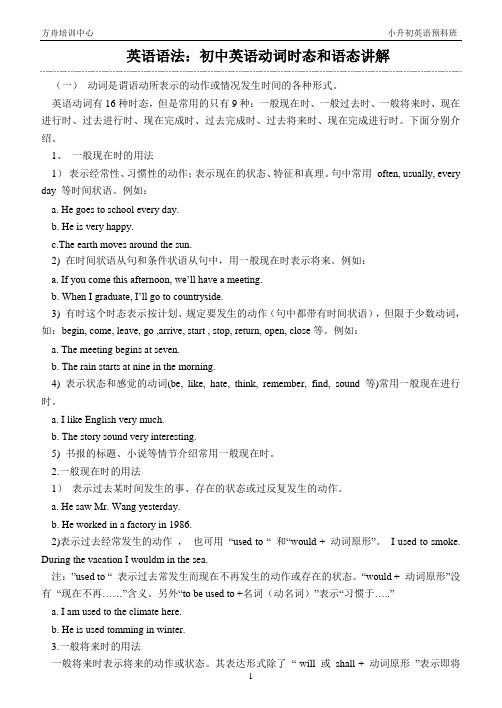
英语语法:初中英语动词时态和语态讲解(一)动词是谓语动所表示的动作或情况发生时间的各种形式。
英语动词有16种时态,但是常用的只有9种:一般现在时、一般过去时、一般将来时、现在进行时、过去进行时、现在完成时、过去完成时、过去将来时、现在完成进行时。
下面分别介绍。
1、一般现在时的用法1)表示经常性、习惯性的动作;表示现在的状态、特征和真理。
句中常用often, usually, every day 等时间状语。
例如:a. He goes to school every day.b. He is very happy.c.The earth moves around the sun.2) 在时间状语从句和条件状语从句中,用一般现在时表示将来。
例如:a. If you come this afternoon, we’ll have a meeting.b. When I graduate, I’ll go to countryside.3) 有时这个时态表示按计划、规定要发生的动作(句中都带有时间状语),但限于少数动词,如:begin, come, leave, go ,arrive, start , stop, return, open, close等。
例如:a. The meeting begins at seven.b. The rain starts at nine in the morning.4) 表示状态和感觉的动词(be, like, hate, think, remember, find, sound 等)常用一般现在进行时。
a. I like English very much.b. The story sound very interesting.5) 书报的标题、小说等情节介绍常用一般现在时。
2.一般现在时的用法1)表示过去某时间发生的事、存在的状态或过反复发生的动作。
a. He saw Mr. Wang yesterday.b. He worked in a factory in 1986.2)表示过去经常发生的动作,也可用“used to “ 和“would + 动词原形”。
动词的时态和语态课件

13. Shirley w__a_s_w__ri_t_in_g_ write a book about China last year but I don’t know whether she has finished it.
补充说明:下列动词没有进行时态: 1. 表示状态的动词: seem look看起 来appear have有belong to own hold容纳
This book belongs to me.
He appears very angry. 2. 表示知道、信念、理解、知识、推测、
怀疑、希望等含义的动词如:know
几种常见时态的区别: 1 一般现在时态和一般过去时态:
He keeps doing morning exercise to keep fit. He felt cold so he sat closer to the fire. 2 一般过去时态和现在完成时态:
He opened the door. He has opened the door. 3 现在完成时态和过去完成时态: He has lived here since he came here.
Tom goes to work every day. 经常的动作 The machine runs smoothly. 特征 He is very happy. 现在的状态 The earth moves around the sun. 客观真理
一般现在时态的特殊用法:
1. 在时间和条件状语从句中用一般现在 时态表示将来的动作
动词时态和语态复习教案
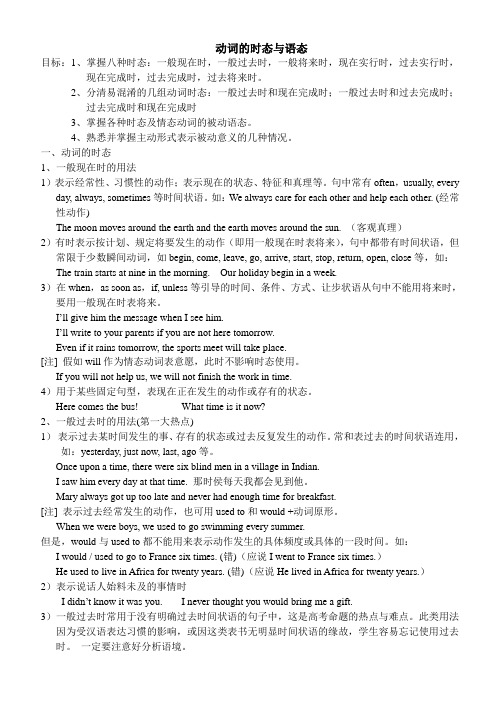
动词的时态与语态目标:1、掌握八种时态:一般现在时,一般过去时,一般将来时,现在实行时,过去实行时,现在完成时,过去完成时,过去将来时。
2、分清易混淆的几组动词时态:一般过去时和现在完成时;一般过去时和过去完成时;过去完成时和现在完成时3、掌握各种时态及情态动词的被动语态。
4、熟悉并掌握主动形式表示被动意义的几种情况。
一、动词的时态1、一般现在时的用法1)表示经常性、习惯性的动作;表示现在的状态、特征和真理等。
句中常有often,usually, every day, always, sometimes等时间状语。
如:We always care for each other and help each other. (经常性动作)The moon moves around the earth and the earth moves around the sun. (客观真理)2)有时表示按计划、规定将要发生的动作(即用一般现在时表将来),句中都带有时间状语,但常限于少数瞬间动词,如begin, come, leave, go, arrive, start, stop, return, open, close等,如:The train starts at nine in the morning. Our holiday begin in a week.3)在when,as soon as,if, unless等引导的时间、条件、方式、让步状语从句中不能用将来时,要用一般现在时表将来。
I’ll give him the message when I see him.I’ll write to your parents if you are not here tomorrow.Even if it rains tomorrow, the sports meet will take place.[注] 假如will作为情态动词表意愿,此时不影响时态使用。
动词时态与语态

动词时态与语态、动词时态与语态的构成、注意事项或重点掌握知识点O表达将来时的形式1)在时间、条件、让步状语从句中,使用一般现在时替代将来时。
如:I ' tell him when you ring again.2) 在make sure, make certain, see (to it) 后的that 从句中,谓语动词用一般现在时替代将来时。
如:See to it that you include in the paper whatever questions they didn 'know the answer to last time.O完成时是时态测试的重中之重,注意与完成时连用的句型和时间状语。
1)当by/between/up to/till + 过去时间、since/by the time/when +表示过去发生情况的从句,这时,主句用过去完成时。
屈:1. We had just had our breakfast when an old mancame to the door.2. Between 1897 and 1919 at least 29 motion picturesin which artificial beings were portrayed had been p roduced.2)当by +将来时间、by the time/when +谓语动词是一般现在时的从句,这时,主句用将来完成时。
如:3)1. By the time you arrive in London, we will havestayed in Europe for two weeks.2.1 hope her health will have imp roved greatly by thetime we come back next year.当by now、since+过去时间或in/during/for/over/the p ast/last + 表示多少的词+years/days/weeks, etc,,这时,主句用现在完成时;但在it is +具体时间+since/before这一句型中,表示“有多少时间”时,主句更多的时候不用完成时。
- 1、下载文档前请自行甄别文档内容的完整性,平台不提供额外的编辑、内容补充、找答案等附加服务。
- 2、"仅部分预览"的文档,不可在线预览部分如存在完整性等问题,可反馈申请退款(可完整预览的文档不适用该条件!)。
- 3、如文档侵犯您的权益,请联系客服反馈,我们会尽快为您处理(人工客服工作时间:9:00-18:30)。
第11 章动词时态及语态真题解析1.Tom _______ always _______ lies.A.is;tellingB./;tellsC./;toldD.has;told解析:考查进行时。
进行时可以和always 连用,表示厌烦或赞赏的语气,答案为A。
2.afternoon,we,football,will,tomorrow,play_______.解析:考查一般将来时。
根据其中的tomorrow 可判断这个句子要用一般将来时,故答案为We will play football tomorrow afternoon.。
考点链接:一般将来时的构成还有be going to + V 原形,be about to do sth.等。
3.The man has known a lot of Chinese since he _______ (come) to China three years ago.解析:考查一般过去时。
根据从句的ago 这一一般过去时的标志词,可判断答案为一般过去时came。
4.It is forty years since he left home.(改为同义句)Forty years _______ since he left home.解析:考查since 用法。
since 引导一般过去时的时间状语从句,主句一般用现在完成时或It is + 时间段,故答案为has passed。
5.He _______ away from home for forty years.解析:考查完成时中的延续动词和瞬间动词。
根据后面的for forty years 这个时间段,可判断句中的完成时要用延续性完成时,动词要用leave 的延续动词be away。
故答案为has been。
考点链接:记住10 个常用的瞬间动词常要变为延续动词:开始离去借来还,出生入死买到家。
即:begin(be on),leave(be away),go(be off),borrow(keep),come(be here),return(be back);join(be in),die(be dead),buy(have),arrive(be here)。
6.Mike broke the window yesterday.(改为被动语态)The window _______ by Mike yesterday.解析:考查一般过去时的被动语态。
一般过去时的被动语态的构成是was/were + V 过去分词。
故答案为was broken。
7.All my friends like shopping in that supermarket.I wonder how long it _______.A.has openedB.has been openC.has been openedD.opened解析:考查现在完成的被动语态。
根据句子中的how long,可判断要用现在完成时,而open是主语it 的动作承受者。
故要用被动语态。
答案为C。
8.— What a clean and bright classroom,isn't it?— Y es,it's always clean and bright because it _______ every day.A.cleansB.cleanedC.is cleanedD.was cleaned解析:考查一般现在时的被动语态。
此空前面的it 指代classroom,也是动词clean 的承受者,故要使用被动语态,且句子含有every day,故应用一般现在时的被动语态,构成是is/am/are + 动词的过去分词。
答案为C。
考点专练考点1 专练用所给动词的适当形式填空1.Three plus two _______ (be) five.3.There _______ (go) the bell!2.Light _______ (travel) faster than sound.4.Here she _______ (come)!5.Tell him about that when he _______ (come).6.If you _______ (ask) her tomorrow,she will help you.7.My father told me that the earth _______ (go) around the sun.8.The notice _______ (say) "No Smoking!".答案:1.is 2.travels 3.goes 4.comes 5.comes 6.ask 7.goes 8.says 考点2 专练按要求变化下面的句型1.I used to walk after dinner.(改为一般疑问句并作肯定回答)__________________________________________2.She used to play near the river.(改为否定句)__________________________________________3.The children didn't use to come here early,_______? (补全反意疑问句)4.Most people used to be late,_______? (补全反意疑问句)5.Li Ying used to play with her dog.(就画线部分提问)__________________________________________?答案:1.Did you use to walk after dinner? Y es,I did./Used you to walk after dinner? Y es,I used.2.She didn't use/usedn't to play near the river.3.did they 4.usedn't they/didn't they 5.What did Li Ying use to do/What used Li Ying to do考点3 专练用将来时回答所提问题,不能简略回答1.Have you finished your homework?Not yet.I _______ (this afternoon).2.Where are you going this Sunday?_______ (the zoo).3.When will your father come back from London?_______ (next week).4.When are they to hand in their plan?_______ (tomorrow morning).5.What time is the film about to begin?_______ (6:15).6.Tom,I need your help._______ (come).7.What are the family doing right now?_______ (leave for England).8.What will the weather be like tomorrow?_______ (sunny).答案:1.am going to do it this afternoon 2.I'm going to the zoo 3.He will come backnext week.4.They are to hand in their plan tomorrow morning 5.It is about to begin at 6:15 6.I'm coming 7.They are leaving for England 8.It will be sunny考点4 专练将下面的英语句子译为汉语,体会其感情色彩1.He is always thinking of his work.2.She is always borrowing my money.3.The little boy was forever making the same mistake.4.She was always changing her mind.5.The girl is always smiling happily.答案:1.他老是想着他的工作。
2.她总是向我借钱。
3.那个小男孩总是犯同样的错误。
4.她老是改变主意。
5.这姑娘总是愉快地微笑着。
考点5 专练改正下面每个句子中的错误1.I'm hearing a strange noise now.2.Now you are looking beautiful.3.The clothes were costing me too much at that time.4.Look! The boy is having two knives.答案:1.I'm hearing → I hear 2.are looking → look 3.were costing → cost 4.is having → has考点6 专练用have (has) gone to,have (has) been to,have (has) been in 填空1.Tim _______ out.He'll be back in an hour.2.Jim _______ this city for two years.3._______ you ever _______ Jinan? It has some famous springs.4.The boy _______ never _______ Beijing.He is always looking forward to seeing the Summer Palace.5.— How long _______ your sister _______ the factory? — About three years.6.I have some Australian friends because I _______ there several times.7.—_______he _______ Germany before? — Maybe not.8.— Why can't we see Mr.Cook? — He's on holiday.He _______ China for a visit.答案:1.has gone 2.has been in 3.Have,been to 4.has,been to 5.has,been in 6.have been 7.Has,been to 8.has gone to考点7 专练根据所给的动词短语,分别用一般过去时和现在完成时造句1.go to the beach__________________________________ __________________________________2.play basketball with friends__________________________________ __________________________________3.not hear of that__________________________________ __________________________________答案:1.He went to the beach last week./He has gone to the beach.2.They played basketball with friends just now./They have played basketball with friends for four hours.3.I didn't hear of that./I haven't heard of that.考点8 专练A) 用所给动词的适当形式填空1.I _______ (buy) this bicycle for five years.2.Y ou can _______ (borrow) it for two days.4.How long _______ you _______(go) this school?5.My brother _______ (join) the army since 1999.6.I _______ (put on) the shoes since three years ago.7.We _______ (not take part in) it for two years.8.The old man _______ (die) since 2000.B) 将下面的句子变为同义句9.We came to this school three years ago.We _______ this school _______ three years.10.My homework was finished last night.My homework _______ since last night.11.They got married two years ago.It _______ since they got married.12.I have been up for two hours.Two hours _______ I got up.答案:A) 1.have had 2.keep 3.has been on 4.have,been in 5.has been in 6.have worn/have been in 7.haven't joined 8.has been dead B) 9.have been in/have studied/taught in;for 10.has been over 11.is two years 12.has passed since 考点9 专练将下面句子的主动语态变为被动语态,被动语态变为主动语态1.The students clean the room every day.__________________________________________2.She gave me twenty yuan last week.__________________________________________3.A present was bought for me by my sister.__________________________________________4.The girl has taken care of the blind men for five years.__________________________________________5.Mary must keep her room clean.__________________________________________6.The children were being looked after by Ann.__________________________________________7.Hangzhou produces silk.__________________________________________8.Y ou can't gee the stars in the daytime.__________________________________________答案:1.The room is cleaned (by the students) every day.2.I was given twenty yuan last week./Twenty yuan was given to me last week.3.My sister bought me a present.4.The blind men have been taken care of for five years.5.Mary's room must be kept clean.6.Ann was looking after the children.7.Silk is produced in Hangzhou.8.The stars can't be seen in the daytime.考点10 专练用所给动词的适当形式填空1.The fur of the cat _______ (feel) very warm.2.The apples _______ (taste) good.3.This kind of food _______ (smell) hot.5.The ball-pen _______ (write) smoothly.6.Y our coat _______ (not wash) easily.7.The book is worth _______ (read).8.Y our hair wants _______ (cut).答案:1.feels 2.taste 3.smells 4.sell 5.writes 6.doesn't wash 7.reading 8.cutting考点11 专练根据汉语提示,用适当的词填空,完成下面的句子1._______ (据说) we will have an English exam tomorrow.2._______ (众所周知) most families have one bike at least.3._______ (大家相信) our government will solve this problem.答案:1.It is said that 2.It is well known that 3.It is believed that考点12 专练用所给动词的正确时态填空1.Look! The children _______ (play) in the playground.I know that they _______ (have) a sports meeting next week.2.The students _______ (talk) loudly when the teacher came in.The teacher _______ (be) very angry.3.My father said he _______ (not give) any presents for my next birthday.4.We _______ (learn) 2000 English words by the end of last term.答案:1.are playing;will have 2.were talking;was 3.wouldn't give 4.had learned 提高练习Ⅰ.单项选择1.The man jumped off the train as soon as it _______.A.stopsB.stoppedC.will stopD.would stop2.I don't know what he _______ at present.A.is doingB.is workingC.doesD.did3.I was doing my homework while they _______ TV.A.is watchingB.watchC.watchedD.were watching4.Hardly _______ the students _______ the finals when they began to play football on the ground.A.did,finishB.would,finishC.had,finishedD.have,finished5.No sooner _______ she _______ into the room than she began doing the cleaning.A.had,comeB.did,comeC.will,comeD.would,come6.There are 200 trees _______ next year.A.plantingB.to plantC.being plantedD.to be planted7.The car _______ Mr.Li.A.belongs toB.belongsC.is belongedD.is belonged to8.The post office _______ now.A.closesB.is closedC.is being closedD.closed9.— _______ you please come with me? — OK!A.Shall B.Can C.Will D.Should10.He was angry because he didn't _______.A.got invitedB.get invitedC.inviteD.Invited答案:1.B。
